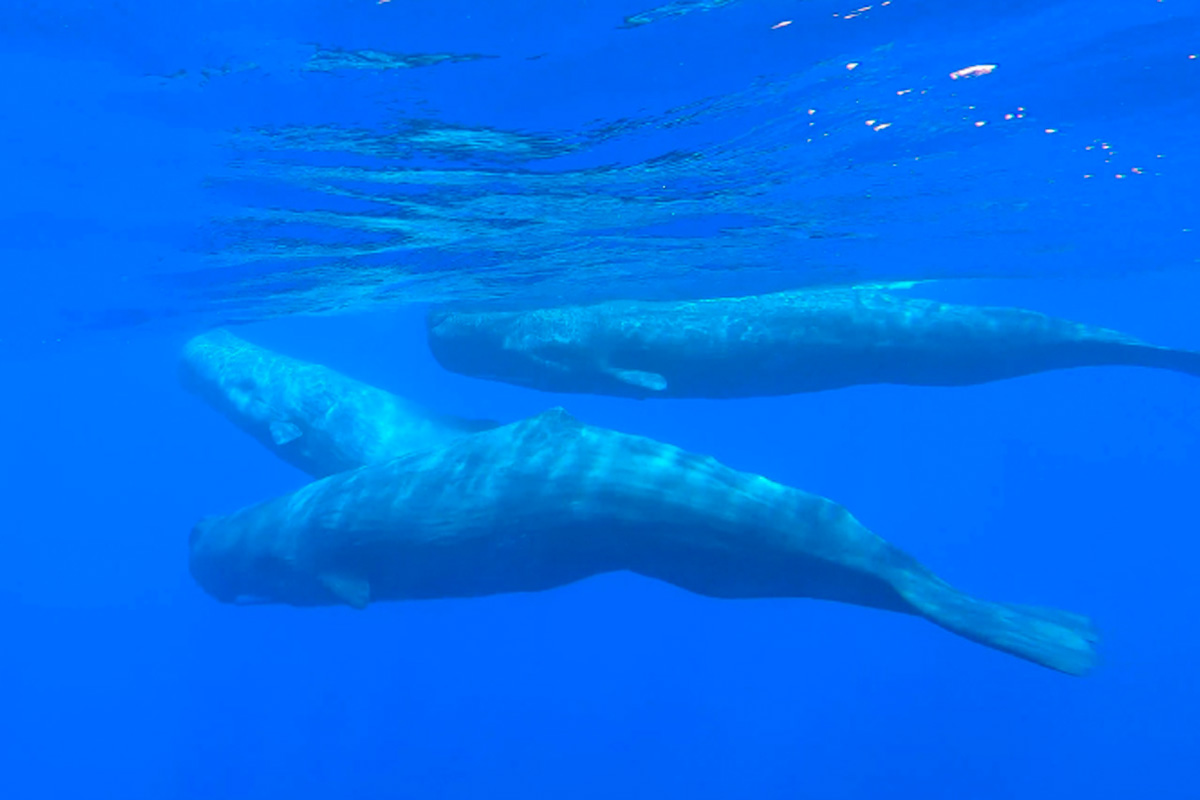Sperm whales, the planet’s largest toothed predator, have incredibly complex social structures and cultural practices.
During a recent WWF-backed research expedition around Greece’s northwestern islands, we learnt more about their unique ways of life and mounting threats.
“Nothing quite prepares you for the moment when you hear their voice emerge from the abyss.”
Chris Johnson, Global Lead of the WWF Protecting Whales & Dolphins Initiative, recalls his fascinating first encounter with sperm whales on a voyage – with the Tethys Research Institute (Italy) and WWF-Greece – in search of greater understanding about these extraordinary creatures in one of their most critical habitats.
Equipped with a specialized hydrophone, an acoustic window into the deep, the team on board the WWF Blue Panda research vessel were lucky enough to experience their highly distinctive sounds in the Hellenic Trench – a complex system of submarine canyons stretching over 1,300 kilometres (approximately 800 miles) from the northern Ionian Sea all the way to Rhodes in the southeastern Aegean Sea.
“What makes this underwater canyon system truly exceptional is its deep bathymetry (seabed terrain),” says Chris.
“The trench plunges to staggering depths of over 5,000 metres (16,400 feet) in its deepest sections, creating near-vertical underwater cliffs that drop away into the darkness.”
These dramatic features create a natural upwelling system, forcing nutrient-rich deep waters toward the surface and generating biological hotspots where marine life flourishes – a perfect habitat for sperm whales making their long, deep dives in search of their main prey: giant squid.
A living library of knowledge
Sperm whales – long-lived, deep-diving toothed whales reaching lengths of 18 metres (60 feet) – have had an evolutionary journey spanning millions of years, and maintain complex societies today that challenge our very understanding of intelligence and culture in the natural world.
The whales form tight-knit family groups, or pods, of females, juveniles and calves.
These matriarchal family units are remarkably cooperative – while some females dive for food, others remain as ‘babysitters’, protecting the young from predators like orcas.
Males typically leave their families during adolescence, joining bachelor groups or becoming solitary.
Social bonds are maintained through clicking conversations that coordinate their activities and preserve their cultural identity.
The unmistakable rhythmic patterns of sperm whale vocalizations are called coda, which typically consist of 3-40 echolocation ‘clicks’ arranged in distinctive, morse-code-like patterns – all made by the largest nose in the animal kingdom to communicate with others, navigate deep seas and find prey.
“If you are privileged enough to see a sperm whale pod, you aren’t just witnessing a group of animals – it’s a living library of cultural knowledge,” says Chris.
“Sperm whales have the largest brain on Earth – nearly six times heavier than a human. Each adult female carries in her extraordinary, accumulated wisdom about foraging grounds, migration routes and social traditions.
“Their clicking conversations represent one of nature’s most sophisticated communication systems.
These aren’t just sounds; they’re the threads that bind their society together as part of larger groups called clans.
New research shows sperm whale clans can span ocean basins.”

Dr Simone Panigada and Viola Panigada from Tethys Research Institute aboard WWF’s Blue Panda © Chris Johnson / WWF
A troubling reality
While some sperm whales range the oceans, this eastern Mediterranean population has adapted to life in a relatively confined sea, developing specialized feeding strategies and incredibly tight social bonds perfectly suited to the complex underwater topography of the Hellenic Trench.
However, this seemingly idyllic situation masks a troubling reality.
Both here and around the world, sperm whales – classified as ‘vulnerable’ by the International Union for Conservation of Nature – are still recovering from the impacts of 20th century whaling while facing mounting pressures from a range of other human activities, including entanglements in fishing gear, ingestion of plastic pollution, overfishing and climate change impacts.
Of particular concern for the 200-250 sperm whales of the Hellenic Trench is the Greek government’s recent acceptance of an expression of interest from oil and gas companies to conduct exploration and exploitation adjacent to the area where, in 2024, the Greek Prime Minister committed to establish a new marine park.
Such oil and gas development would be very bad news for this population whose living space is already crisscrossed by one of the busiest shipping routes in the region: the cause of both catastrophic ship strikes and disruption to their biosonar – so crucial for communicating, navigating and feeding – by underwater noise of each passing ship.
“Yet, there is hope,” says Chris.
“Each encounter we document improves our understanding of the sophisticated social lives these animals lead and adds weight to our case for their protection.
“Protecting sperm whales means preserving more than just a species – it means safeguarding an ancient cultural heritage that enriches our ocean.
“Their future depends on the choices we make today to protect their deep-water canyons and ensure safe passage.
“In doing so, we preserve both generations of families and ocean wisdom that has endured for millennia.”
See more:
WWF’s work on ocean conservation
WWF’s work on safeguarding whales
WWF-Greece
Información extraída de: https://wwf.panda.org/?13948366/Sperm-whales-safeguarding-their-unique-culture







